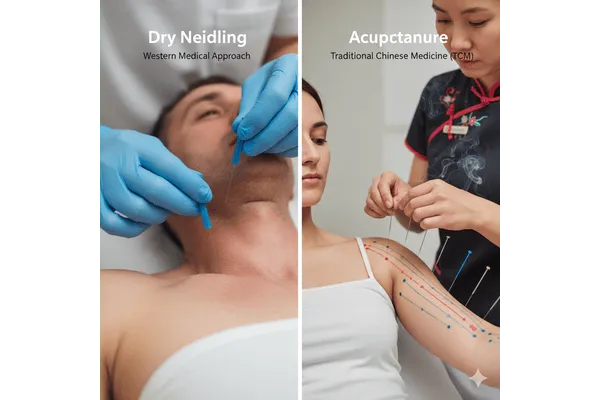
Dry Needling vs. Acupuncture: Key Differences You Should Know
Many people confuse dry needling and acupuncture because both use thin needles inserted into the body. While they may appear similar, they are distinct therapies with different purposes, techniques, and outcomes.
At NJ Rehab Experts, we specialize in dry needling as part of physical therapy to treat muscle pain, trigger points, and improve mobility. Understanding the differences helps you choose the right treatment for your condition.
What Is Dry Needling?
Dry needling is a modern, evidence-based technique used by physical therapists to target myofascial trigger points—tight knots or bands in muscles that cause pain and restricted movement.
Key features:
Focused on musculoskeletal pain
Uses thin, sterile needles inserted directly into trigger points
Aims to release tension, reduce pain, and restore mobility
Often combined with manual therapy and exercises for full rehabilitation
What Is Acupuncture?
Acupuncture is a traditional Chinese medicine practice dating back thousands of years. It involves inserting thin needles into specific points along the body’s meridians to balance energy flow (Qi).
Key features:
Focuses on overall wellness and energy balance
Can address chronic pain, stress, digestive issues, headaches, and insomnia
Sometimes combined with herbal medicine or other holistic therapies
Based on traditional Eastern medicine theory rather than Western anatomy
Benefits of Dry Needling
Muscle tension release: Directly relaxes tight muscles
Improved mobility: Helps patients regain range of motion
Pain relief: Effective for chronic back, neck, shoulder, and limb pain
Supports rehabilitation: Often used post-surgery or for sports injuries
Quick results: Many patients feel relief after a few sessions
Benefits of Acupuncture
Stress reduction: Promotes relaxation and mental well-being
Pain management: Can relieve chronic headaches, migraines, and joint pain
Holistic wellness: Addresses multiple systems in the body
Complementary therapy: Often used alongside other treatments like herbal medicine
Which One Should You Choose?
Choose Dry Needling If:
You have muscle pain, stiffness, or trigger points
You are undergoing physical therapy or rehab
You want science-based, measurable results
Choose Acupuncture If:
You are seeking holistic wellness or energy balancing
You want relief from stress, headaches, or systemic issues
You are comfortable with traditional Chinese medicine methods
Is Dry Needling Safe?
Dry needling is safe when performed by licensed physical therapists. Common side effects are minor: slight soreness, mild bruising, or temporary discomfort.
Precautions:
Avoid if you have bleeding disorders or are needle-averse
Certain areas may be avoided during pregnancy

Is Acupuncture Safe?
Acupuncture is generally safe when performed by licensed acupuncturists. Side effects may include minor bruising, soreness, or fatigue.
Precautions:
Inform your practitioner of any medical conditions or medications
Ensure needles are sterile and single use
NJ Rehab Experts Approach to Dry Needling
At NJ Rehab Experts, our therapists integrate dry needling into physical therapy programs to treat:
Neck and back pain
Shoulder or rotator cuff injuries
Sports-related muscle tightness
Post-surgical rehabilitation
Chronic myofascial pain
We combine dry needling with manual therapy, corrective exercises, and posture training to ensure long-term relief and mobility improvement.
📧 [email protected] | 📞 (212) 227-3233
�� https://njrehabexperts.com/dry-needling-vs-acupuncture-nj
Conclusion
While dry needling and acupuncture both use thin needles, they serve different purposes. Dry needling is a modern, evidence-based therapy for muscle pain and functional recovery, whereas acupuncture is a traditional approach focused on holistic wellness.
Choosing the right therapy depends on your goals, whether it's targeted pain relief or overall health and balance.
If you’re struggling with muscle pain or limited mobility, dry needling at NJ Rehab Experts may be the solution.
